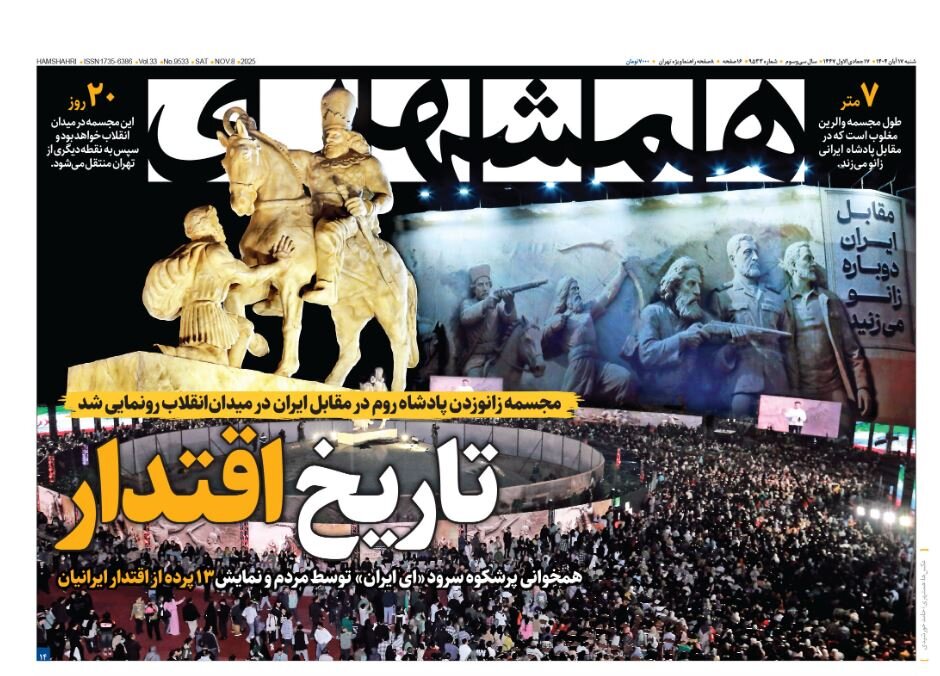The negotiation traps

TEHRAN - Hamshahri analyzed Donald Trump’s latest remarks. It wrote: In his recent statement, Trump declared: “I was very much in charge of” Israel’s attack on Iran.
The U.S. President uttered these words on Thursday night in talks with reporters at the White House. His remarks further completed the puzzle of the negotiation trap laid before Iran; a trap whose two main levers are sanctions and military aggression. Although Trump has tried in recent months to present himself as a peacemaker, his admission of involvement in the 12-day war waged by the Zionist regime against Iran offers a more complete picture of the belligerent posture of the Trump–Netanyahu axis. A key aspect of this posture is the strategic use of negotiations as a trap for Iran. Moreover, the President’s latest comments add another piece to the domino chain of falsehoods he has spread about Iran; falsehoods that have surfaced in various forms over recent weeks and months. His current acknowledgment of direct involvement in the Israeli regime’s attack on Iran stands in stark contrast to his earlier denials that the U.S. “had nothing to do” with the attacks.
Kayhan: Don’t seek solutions to Iran’s problems in American synagogues
Kayhan examined Trump’s failed approach and wrote: Trump, following his own unique model, believes that threats will force rivals into agreement. Yet America’s one-sided strategy of extracting concessions from China, Russia, and Iran has failed. Even a military strike on Iran’s nuclear facilities did not lead to a change in Tehran’s nuclear policy, let alone a shift in its fundamental political stance. Interestingly, some still believe that America is so powerful it can impose any policy it wishes on its enemies or rivals, with no escape. Hearing such claims in Iran is surprising, given that few countries have experienced confrontation with the U.S. as Iran has and emerged as a regional power by rejecting it. Those who, despite America’s hostility, still seek solutions to Iran’s problems from American synagogues are not only walking a misguided path, but they will never reach their destination. Today’s America, even if willing, lacks the capacity to resolve Iran’s challenges.
Arman-e-Melli: Iran’s dialogue-oriented approach
In a commentary, Arman-e-Melli highlighted Iran’s commitment to peaceful engagement. The paper said: As much as nations strive to prevent tension, conflict, and war, they equally emphasize peaceful dialogue and negotiation to reach mutual agreements in the pursuit of peace and reconciliation. The Islamic Republic of Iran, long a proponent of regional and global stability, has consistently championed negotiation and dialogue, demonstrating its commitment across a range of international issues. This approach is evident not only in Iran’s stance on the nuclear agreement (JCPOA) but also in its active participation in various treaties, conventions, and organizations. Iran’s engagement with the Shanghai Cooperation Organization, BRICS, and the D-8 group of developing countries reflects its enduring diplomatic posture. Despite this, it is Iran that has remained committed to negotiations—while Western counterparts have repeatedly abandoned the table.
Shargh: Neglecting the Caucasus is a dangerous gap in foreign policy strategy
While Iran’s foreign policy has largely focused on major issues such as nuclear negotiations, tensions with the U.S. and Europe, the possibility of renewed conflict with Israel, and broader Middle East dynamics, the South Caucasus file has been sidelined. Yet developments in Iran’s northwestern frontier are rapidly evolving, and any neglect could carry long-term costs for national security. Azerbaijan, capitalizing on Iran and Russia’s diverted attention, is advancing a project that shifts the region’s geopolitical balance in favor of the West. In this context, Iran must urgently recalibrate its Caucasus policy along three strategic axes: Strengthen political ties with Armenia, expand economic cooperation with this country as Iran’s sole land route to the north. Also, activate multilateral diplomacy with Russia, China, and Central Asian states to curb NATO’s growing influence in the region, as well as adopt a deterrent posture against any geopolitical shifts that threaten Iran’s interests. The Caucasus is no longer peripheral; it has become a direct arena of global competition. Any delay in decision-making could pave the way for the consolidation of a “NATO corridor” and the strategic containment of Iran.
Leave a Comment